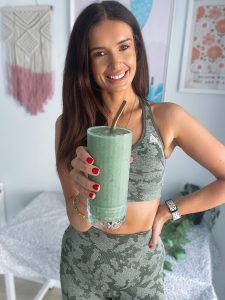The Truth About Counting Calories
By Nutritionist, Jess Bloom.


Should we be counting calories? Shouldn’t we be counting calories? Forever a controversial topic purely because not everyone understands it. Counting calories means keeping track of the amount of food and drink you’re consuming day to day, usually in order to manage your weight, whether that’s to lose weight, maintain weight or gain weight.
So, let’s discuss, should we be doing it? How do we do it? Why do we do it? And why is there always controversy around it?
It all depends on whether you have goals that relate to your body composition. Do you want to lose body fat? Do you want to build lean muscle? If the answer is yes, then I would say yes – you should be counting calories. Because tracking your calories is very simply put, a tool. Exactly like your internet banking app. If you decided you wanted to save a certain amount of money, you’d probably try and keep tabs on how much you’re spending right? Or if you went on a big night out, maybe you would set yourself a budget to keep in line with your saving goals. What gets measured gets managed and although it’s not something that needs to be done forever, it is just a way of ensuring that your caloric input is in line with your goals without just shooting blind. For reference – a lot of individuals who want to lose weight (and are not tracking) will generally find that they restrict and under eat significantly which will often lead to a ‘binge/restrict’ mentality, as well as down regulating their metabolism and often effecting their hormones. If fat loss is the goal, the aim is to eat as much as possible whilst still being in a calorie deficit. If your goal is to build muscle then the goal is to eat as much as possible, whilst minimising body fat gain and maximising muscle gain.
So why do we often hear things like ‘counting calories doesn’t work’? Technically, this is true, as just counting calories alone won’t do anything for you unless the following 2 things are considered. Firstly – not all foods are created equally. If you read last month’s column you’ll remember there are 3 macronutrients that make up our foods; protein, carbohydrates and fats. The reason this is important to take into account is because our body uses a certain number of calories from each macronutrient simply to digest it. For example, if we’re consuming protein (maybe a chicken breast or some Greek yoghurt) we will use up to a third of the calories digesting it. When consuming carbohydrates, we will use between 5-15% (depending on the type of carbohydrate – sugar/fibre e.g. a doughnut vs some brown rice) and when consuming fats (e.g. oils, avocado’s, nuts) we only use a maximum of 5% digesting it. (this is known as the thermic effect of food aka TEF). So if you require 2000 calories each day to maintain your weight, consuming 2000 calories of protein vs 2000 calories of fats will not produce the same result. There will be a lot less calories available to be used for energy from the protein due to thermic effect in the body.
 The second thing is – every single person is unique and will require a different amount of calories/macros to meet their goals. This varies based on so many factors from age, gender, weight, height, dieting history, muscle mass, activity levels, hormones etc. There is no one size fits all! So just eating what someone else is eating because you think they look good is never going to work.
The second thing is – every single person is unique and will require a different amount of calories/macros to meet their goals. This varies based on so many factors from age, gender, weight, height, dieting history, muscle mass, activity levels, hormones etc. There is no one size fits all! So just eating what someone else is eating because you think they look good is never going to work.
 So, for the most important question, how do we get it right for us?! My advice is, and what has worked for the hundreds of clients I’ve helped achieve their goals, is firstly, set yourself a protein target alongside your daily calorie allowance, no matter what your goals are, this is key! Secondly, have a professional calculate your calories and macros for you (do not let apps like My Fitness Pal do this for you!) You can use that as a starting point and undergo a bit of trial and error until you find your sweet spot. Lastly – actual results are not quick, whether that’s fat loss or muscle gain, it is a process which takes patience and consistency (despite magazine covers stating that you can ‘drop a jean size in a week’).
So, for the most important question, how do we get it right for us?! My advice is, and what has worked for the hundreds of clients I’ve helped achieve their goals, is firstly, set yourself a protein target alongside your daily calorie allowance, no matter what your goals are, this is key! Secondly, have a professional calculate your calories and macros for you (do not let apps like My Fitness Pal do this for you!) You can use that as a starting point and undergo a bit of trial and error until you find your sweet spot. Lastly – actual results are not quick, whether that’s fat loss or muscle gain, it is a process which takes patience and consistency (despite magazine covers stating that you can ‘drop a jean size in a week’).
I hope you’ve taken away a few things here! Mainly that tracking is basically just a tool for fat loss, different foods hold different nutritional value which should be taken into account, and there is no one size fits all when it comes to YOUR health and fitness journey.










